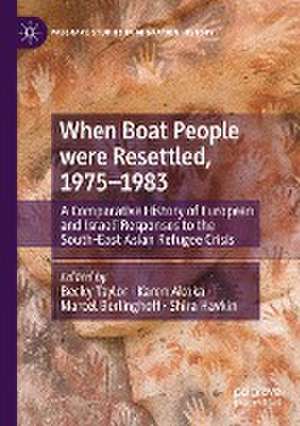When Boat People were Resettled, 1975–1983: A Comparative History of European and Israeli Responses to the South-East Asian Refugee Crisis: Palgrave Studies in Migration History
Editat de Becky Taylor, Karen Akoka, Marcel Berlinghoff, Shira Havkinen Limba Engleză Paperback – 23 iun 2022
This book traces the reception and resettlement of Vietnamese, Cambodians and Laotians in France, Germany, the United Kingdom, the Netherlands and Israel during the 'boat people' crisis of 1975–79. These years saw hundreds of thousands of people displaced by the emergence of the Socialist Republic of Vietnam and political instability across south-east Asia. Using a comparative historical approach, the authors demonstrate the multiple ways in which refugees were contested, accepted, received and resettled across different national contexts. This episode is held up today as an example of European generosity. Yet this book illustrates how the reception of boat people in Western Europe and Israel was shaped by the Cold War, and by specific national preoccupations over international prestige, immigration, labour supply and the place of foreign-born strangers in their increasingly diverse societies. While the post-2015 refugee crisis in Europe has often been construed as a new challenge requiring an unprecedented coordinated international response, this book shows the longer history of such dilemmas.
Chapter 4 is available open access under a Creative Commons Attribution 4.0 International License via link.springer.com.
| Toate formatele și edițiile | Preț | Express |
|---|---|---|
| Paperback (1) | 692.74 lei 43-57 zile | |
| Springer International Publishing – 23 iun 2022 | 692.74 lei 43-57 zile | |
| Hardback (1) | 698.15 lei 43-57 zile | |
| Springer International Publishing – 22 iun 2021 | 698.15 lei 43-57 zile |
Preț: 692.74 lei
Preț vechi: 814.99 lei
-15% Nou
Puncte Express: 1039
Preț estimativ în valută:
132.56€ • 138.75$ • 110.33£
132.56€ • 138.75$ • 110.33£
Carte tipărită la comandă
Livrare economică 31 martie-14 aprilie
Preluare comenzi: 021 569.72.76
Specificații
ISBN-13: 9783030642266
ISBN-10: 3030642267
Ilustrații: X, 239 p.
Dimensiuni: 148 x 210 mm
Greutate: 0.3 kg
Ediția:1st ed. 2021
Editura: Springer International Publishing
Colecția Palgrave Macmillan
Seria Palgrave Studies in Migration History
Locul publicării:Cham, Switzerland
ISBN-10: 3030642267
Ilustrații: X, 239 p.
Dimensiuni: 148 x 210 mm
Greutate: 0.3 kg
Ediția:1st ed. 2021
Editura: Springer International Publishing
Colecția Palgrave Macmillan
Seria Palgrave Studies in Migration History
Locul publicării:Cham, Switzerland
Cuprins
1. Introduction.- 2. France: ‘Boat people’ brought by plane - Karen Akoka.- 3. Germany: ‘Refugie-surprise’: The unlikely reception of Indochinese boat-people in Germany - Marcel Berlinghoff.- 4. Britain: ‘Our most foreign refugees’: refugees from Vietnam in Britain - Becky Taylor.- 5. The Netherlands: ‘Boat people’ as changemakers in the Dutch refugee system - Julia Kleinschmidt.- 6. Israel: Asylum without refugee status: Israel’s reception of Vietnamese exiles.- 7. Bibliography.
Notă biografică
Becky Taylor is Professor of Modern History at the University of East Anglia, UK.
Karen Akoka is an Associate Professor in Political Science, Paris Nanterre University, France, a researcher at the Institut des Sciences Sociales du Politique and a Fellow of the Institut Convergences Migrations.
Marcel Berlinghoff is a senior researcher and member of the Institute for Migration Research and Intercultural Studies (IMIS), Osnabrueck University, Germany
Shira Havkin is an affiliated researcher at Sciences-Po CERI, France, and a fellow of the Institut Convergences Migrations.
Textul de pe ultima copertă
This book traces the reception and resettlement of Vietnamese, Cambodians and Laotians in France, Germany, the United Kingdom, the Netherlands and Israel during the 'boat people' crisis of 1975–79. These years saw hundreds of thousands of people displaced by the emergence of the Socialist Republic of Vietnam and political instability across south-east Asia. Using a comparative historical approach, the authors demonstrate the multiple ways in which refugees were contested, accepted, received and resettled across different national contexts. This episode is held up today as an example of European generosity. Yet this book illustrates how the reception of boat people in Western Europe and Israel was shaped by the Cold War, and by specific national preoccupations over international prestige, immigration, labour supply and the place of foreign-born strangers in their increasingly diverse societies. While the post-2015 refugee crisis in Europe has often been construed as a new challenge requiring an unprecedented coordinated international response, this book shows the longer history of such dilemmas.
Chapter 4 is available open access under a Creative Commons Attribution 4.0 International License via link.springer.com.
Caracteristici
Offers a comparative account of how the United Kingdom, France, Germany, the Netherlands and Israel responded to the Southeast Asian refugee crisis of 1979 Unpicks the different factors underpinning each European nation’s agreement to accept ‘boat-people’ from Southeast Asia and their very different treatment post-resettlement Provides insights into policies specific to individual countries, while revealing pan-European trends during a critical period of political and social change














